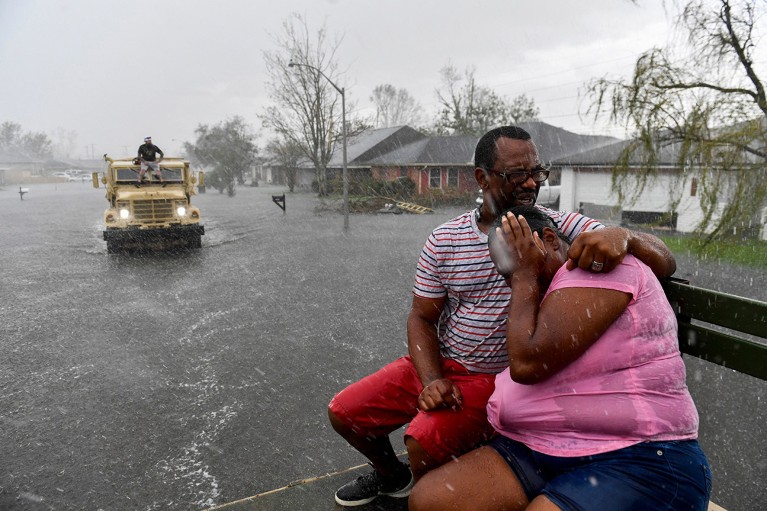Hello Nature readers, would you like to get this Briefing in your inbox free every day? Sign up here.
Trucks evacuate people from a neighbourhood in LaPlace, Louisiana, that was flooded by Hurricane Ida in 2021.Credit: Patrick T. Fallon/AFP via Getty
Major US climate disaster every three weeks
The fifth US National Climate Assessment has determined that global warming causes US$150 billion in direct damages across the country each year, and the costs are rising. From 2018 to 2022, the country experienced 89 major climate disasters — equivalent to one every three weeks. The country is also falling short on its goal to slash greenhouse-gas emissions. There are signs of hope: alongside the report, the government announced more than $6 billion in funding for infrastructure, clean energy and climate resilience. “This is not about curling up in a corner in despair,” says climate economist Rachel Cleetus. “There are very concrete steps we can take to cut our emissions and to promote climate resilience.”
Nature | 6 min read
Reference: Fifth National Climate Assessment
Features & opinion
Who should pay for open-access publishing?
Article-processing charges (APCs) are meant to cover publishers’ costs — such as administration, editing and typesetting — and ensure that papers are free to read. But critics say that the fees are often exorbitant and that they perpetuate global inequities. In one emerging alternative model, institutions, funders or governments — rather than authors — would pay APCs. Another option is a fixed annual fee paid by institutions based on their researchers’ publishing activity. Some journals are maintaining paywalls until subscriptions reach a minimum target; others allow researchers to share their own papers.
Nature | 8 min read
What’s causing record Amazon drought
An unprecedented drought is gripping the Amazon this year, brought on by three things: deforestation is hobbling the rainforest’s resilience, the El Niño climate pattern is reducing rainfall in northern South America and unusual warming in the northern Atlantic Ocean is moving storms away from northern Brazil. And “things are not going to get any better”, says climate-change researcher Luciana Gatti. The current El Niño is just getting started, and climate change is causing stronger and more frequent episodes of drought. “The forest’s tipping point is coming closer — and it’s coming quick.”
Nature | 6 min read
Chemical weapons need to stay gone
The world’s last remaining declared chemical-weapons stockpiles have been destroyed. Countries have to be more open to sharing data on regulated chemicals to ensure that these weapons don’t re-emerge, says Peter Hotchkiss, science-policy adviser at the Organisation for the Prohibition of Chemical Weapons (OPCW). He suggests a stepwise approach, starting with sharing information only to the OPCW before facilitating data exchange between all 193 member states.
Nature | 5 min read
Politicization warps our COVID memories
Polarization between people who are vaccinated against COVID-19 and those who aren’t is distorting how people recall the facts of the pandemic. Researchers surveyed more than 10,000 people across 11 countries (mostly wealthy ones in the Northern Hemisphere) and found that:
• People who identified strongly with their unvaccinated status were more likely to remember their earlier estimation of the risk as lower than it actually was.
• Conversely, and more markedly, those who had been vaccinated overestimated their earlier perception of their risk of catching the disease.
• People for whom being vaccinated or unvaccinated was especially relevant for their identity tended to have particularly biased memories.
The results give pause for thought as countries review their pandemic strategies to inform future plans, argues a Nature editorial. “When looking back, we should all be aware that we have biased memories,” says psychologist and co-author Cornelia Betsch. “You could be right or wrong. I could be right or wrong. Or, most likely, we’re all wrong.”
Nature | 5 min read
Reference: Nature paper
Infographic of the week
STEM conferences in India with no female speakers

In the past three years, 35% of all science, technology, engineering and mathematics (STEM) conferences held in India featured only male speakers. “I knew it was bad. I just didn’t know how bad,” says neuroscientist Shruti Muralidhar, who co-authored a preprint that revealed the disparity for periods shown above as phase 1 (June 2020–August 2021) and phase 2 (August 2021–March 2023). They also found that, on average, women make up just 16.7% of the STEM faculty across 98 Indian universities and institutes. (Nature | 5 min read)
Reference: bioRxiv preprint (not peer reviewed)
